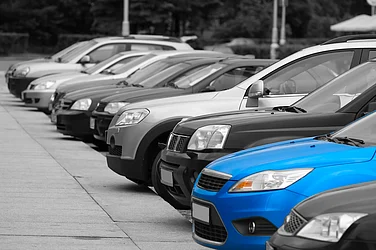The Federation of Automobile Dealers Associations (FADA) announced on Monday that total vehicle registrations in India dropped by 29.85 per cent to 1,52,71,519 units in the financial year 2020-21, the lowest in the last eight years. In fiscal year 2019-20, total vehicle registrations were 2,17,68,502 units.
With the exception of tractors, all vehicle types were in the red in FY21, with two-wheelers (2W), three-wheelers (3W), commercial vehicles (CV), and passenger vehicles (PV) dropping by 31.51 per cent, 64.12 per cent, 49.05 per cent, and 13.96 per cent, respectively—the lowest in the last eight years and well below FY13 levels, according to FADA. PV registrations were 23,86,316 units last fiscal, down 13.96 per cent from 27,73,514 units in FY20, and two-wheeler registrations were 1,15,33,336 units, down 31.51 per cent from 1,68,38,965 units the previous fiscal. 3W registrations in FY21 were down 64.12 per cent at 2,58,174 units, as compared to 7,19,594 per cent in FY20, while CV registrations were at 4,48,914 units as against 8,81,114 units, a decline of 49.05 per cent, FADA said. Tractor registrations, however, grew by 16.11 per cent last fiscal at 6,44,779 units as compared to 5,55,315 units in 2019-20, it added.
As for April 2021, FADA said since India was under complete lockdown in April 2020 and not a single vehicle could be sold, a year-on-year comparison is not possible. When compared to the previous month of March, FADA said in April 2021 total vehicle registrations were down 28.15 per cent at 11,85,374 units versus 16,49,678 units. PV registrations were down 25.33 per cent at 2,08,883 units in April, as against 2,79,745 units in March this year, while those of 2W declined by 27.63 per cent at 8,65,134 units, as against 11,95,445 in the previous month, it added. Registrations of CV were at 51,436 units in April as compared to 67,372 units in March, down 23.65 per cent. Tractor registrations also witnessed a dip of 44.58 per cent last month at 38,285 units, as compared to 69,082 units in March this year, the automotive dealers’ body said. Commenting on the current situation, FADA President Vinkesh Gulati said, "India is currently facing one of its toughest times with the second wave of Covid creating havoc in everyone's life. This time, the spread is not only limited to urban markets but has also taken rural India in its grasp." Auto registrations in April witnessed a double-digit fall as most of the Indian states started going under lockdown, partial as well as full, beginning April 5 onwards, he added.
"Unlike last year, the lockdown this time around has been imposed by state governments and not the Central government. Due to this, there have been no relief announcements which have come out till now either by the Center or the RBI and auto Original Equipment Manufacturers (OEMs)," Gulati said. Asking automobile manufacturers to handhold their dealers the way they did last year during the first phase of the pandemic, he said the current "situation is very grim in most states and dealer principals as well as their teams are fighting for their survival from Covid". "FADA also requests OEMs to not burden dealers with high billings in all the states where lockdown has been announced," Gulati said, while also asking the government "to come out with a financial package, the way they did last year". He further said, "We also request the RBI to come out with guidelines/notifications for relaxation of loan repayment equivalent to the tune of the number of days of lockdown each state has announced." On the near-term outlook, FADA said the first nine days of May have seen extremely lean sales due to the lockdown announced by the majority of states as dealership outlets remained closed." Even where dealerships are open, the walk-ins have dropped to 30 per cent and customers are delaying their purchase decision," it said. Considering the rising number of Covid cases, the peak in terms of infections for India on a whole could be at least a fortnight away. The just-concluded elections in states like West Bengal, Tamil Nadu, Kerala, and Assam, movement of migrant workers back to states like Uttar Pradesh and Bihar can keep the curve rising, FADA said.
"FADA hence maintains absolute sluggishness for the month of May as most of the states have announced an extension of lockdown till the end of the month," it added. For the long-term outlook, FADA said the second wave of the pandemic has not only unsettled urban but also the rural markets this time around. "Recovery hence looks to take a longer time when compared to recovery which came after the first wave. The only ray of hope lies on the on-time arrival monsoon which is likely to enter India through the southern coast around June 1," it said. With the prediction of an average monsoon this year, expectations have been raised of higher farm output, which is central to the country's economy, FADA said adding "this will also lead to rural markets recovering faster than urban. Also, categories like tractors and 2W will have a rub-off effect in terms of recovery".































